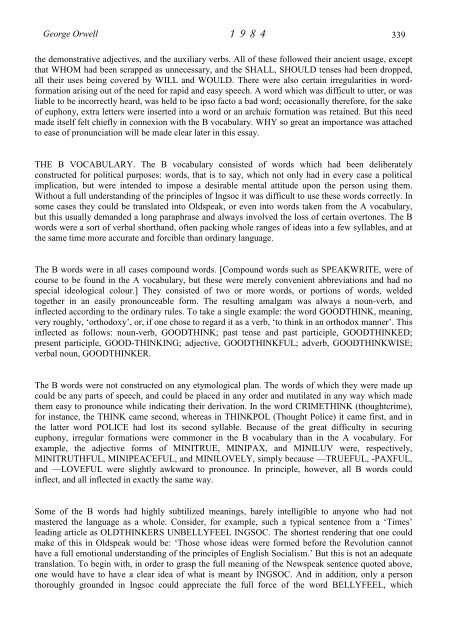Create successful ePaper yourself
Turn your PDF publications into a flip-book with our unique Google optimized e-Paper software.
George Orwell 1 9 8 4<br />
the demonstrative adjectives, and the auxiliary verbs. All of these followed their ancient usage, except<br />
that WHOM had been scrapped as unnecessary, and the SHALL, SHOULD tenses had been dropped,<br />
all their uses being covered by WILL and WOULD. There were also certain irregularities in wordformation<br />
arising out of the need for rapid and easy speech. A word which was difficult to utter, or was<br />
liable to be incorrectly heard, was held to be ipso facto a bad word; occasionally therefore, for the sake<br />
of euphony, extra letters were inserted into a word or an archaic formation was retained. But this need<br />
made itself felt chiefly in connexion with the B vocabulary. WHY so great an importance was attached<br />
to ease of pronunciation will be made clear later in this essay.<br />
THE B VOCABULARY. The B vocabulary consisted of words which had been deliberately<br />
constructed for political purposes: words, that is to say, which not only had in every case a political<br />
implication, but were intended to impose a desirable mental attitude upon the person using them.<br />
Without a full understanding of the principles of Ingsoc it was difficult to use these words correctly. In<br />
some cases they could be translated into Oldspeak, or even into words taken from the A vocabulary,<br />
but this usually demanded a long paraphrase and always involved the loss of certain overtones. The B<br />
words were a sort of verbal shorthand, often packing whole ranges of ideas into a few syllables, and at<br />
the same time more accurate and forcible than ordinary language.<br />
The B words were in all cases compound words. [Compound words such as SPEAKWRITE, were of<br />
course to be found in the A vocabulary, but these were merely convenient abbreviations and had no<br />
special ideological colour.] They consisted of two or more words, or portions of words, welded<br />
together in an easily pronounceable form. The resulting amalgam was always a noun-verb, and<br />
inflected according to the ordinary rules. To take a single example: the word GOODTHINK, meaning,<br />
very roughly, ‘orthodoxy’, or, if one chose to regard it as a verb, ‘to think in an orthodox manner’. This<br />
inflected as follows: noun-verb, GOODTHINK; past tense and past participle, GOODTHINKED;<br />
present participle, GOOD-THINKING; adjective, GOODTHINKFUL; adverb, GOODTHINKWISE;<br />
verbal noun, GOODTHINKER.<br />
The B words were not constructed on any etymological plan. The words of which they were made up<br />
could be any parts of speech, and could be placed in any order and mutilated in any way which made<br />
them easy to pronounce while indicating their derivation. In the word CRIMETHINK (thoughtcrime),<br />
for instance, the THINK came second, whereas in THINKPOL (Thought Police) it came first, and in<br />
the latter word POLICE had lost its second syllable. Because of the great difficulty in securing<br />
euphony, irregular formations were commoner in the B vocabulary than in the A vocabulary. For<br />
example, the adjective forms of MINITRUE, MINIPAX, and MINILUV were, respectively,<br />
MINITRUTHFUL, MINIPEACEFUL, and MINILOVELY, simply because —TRUEFUL, -PAXFUL,<br />
and —LOVEFUL were slightly awkward to pronounce. In principle, however, all B words could<br />
inflect, and all inflected in exactly the same way.<br />
Some of the B words had highly subtilized meanings, barely intelligible to anyone who had not<br />
mastered the language as a whole. Consider, for example, such a typical sentence from a ‘Times’<br />
leading article as OLDTHINKERS UNBELLYFEEL INGSOC. The shortest rendering that one could<br />
make of this in Oldspeak would be: ‘Those whose ideas were formed before the Revolution cannot<br />
have a full emotional understanding of the principles of English Socialism.’ But this is not an adequate<br />
translation. To begin with, in order to grasp the full meaning of the Newspeak sentence quoted above,<br />
one would have to have a clear idea of what is meant by INGSOC. And in addition, only a person<br />
thoroughly grounded in Ingsoc could appreciate the full force of the word BELLYFEEL, which<br />
339


